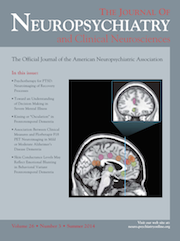Association Between Clinical Measures and Florbetapir F18 PET Neuroimaging in Mild or Moderate Alzheimer’s Disease Dementia
Abstract
Clinical diagnosis of Alzheimer’s disease (AD) is challenging, with 20% or more of patients misdiagnosed, even by expert clinicians. The authors conducted a retrospective, cross-sectional analysis comparing baseline neuropsychiatric and other clinical characteristics in 199 expert-diagnosed mild and moderate AD dementia patients participating in industry-sponsored clinical trials of an investigational therapy, where 18% lacked florbetapir positron emission tomography (PET) evidence of AD neuropathology. Significant differences were found only for cognition and ApoE ε4 status, but the large degree of score overlap would preclude using these measures to predict AD misdiagnosis. This study highlights the value of amyloid PET when evaluating patients with seemingly typical AD.



